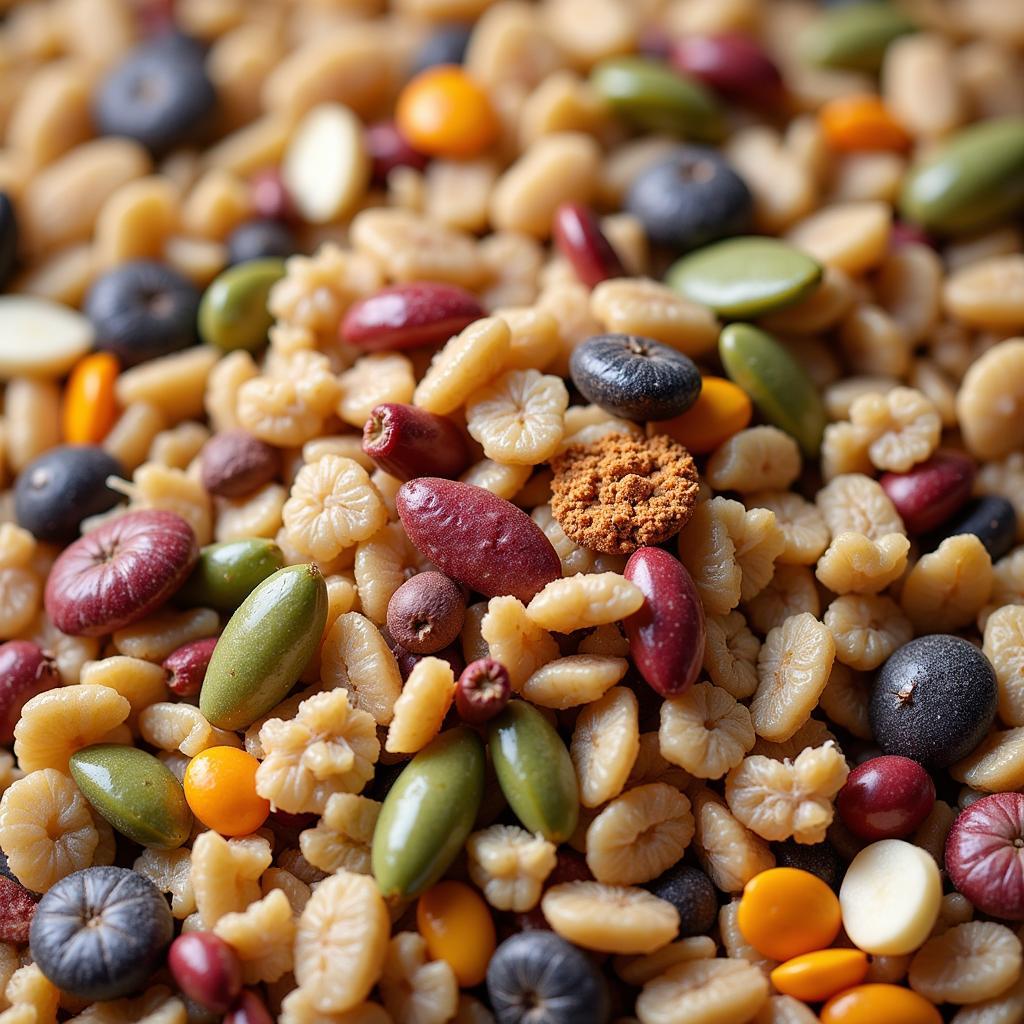Dove feed, also known as pigeon feed, has recently gained attention as a potential feed option for horses. This article will delve into the nutritional composition of dove feed, exploring its potential benefits and drawbacks for horses, and ultimately answering whether it’s a suitable addition to their diet.
Understanding Dove Feed and Its Components
Dove feed is typically a mix of grains, seeds, and legumes formulated to meet the dietary needs of pigeons. Common ingredients include wheat, milo, corn, peas, vetch, and safflower seeds. While some of these ingredients are also present in horse feed, the proportions and overall nutritional profile differ significantly.
Nutritional Breakdown of Dove Feed
A typical dove feed blend provides a good source of energy, primarily from carbohydrates. It also contains a moderate amount of protein, essential for muscle growth and repair. However, the protein content is generally lower than what’s recommended for horses, especially those in training or performing strenuous work. Furthermore, the calcium and phosphorus ratios in dove feed are often not balanced for equine requirements.
 Dove Feed Ingredients Close-Up
Dove Feed Ingredients Close-Up
Can Horses Eat Dove Feed? Exploring the Pros and Cons
While some horse owners might consider dove feed a cost-effective alternative to traditional horse feed, its suitability is questionable. While horses can physically eat dove feed, the question is whether they should. Let’s analyze the potential advantages and disadvantages.
Potential Benefits (Limited)
- Cost-Effectiveness: Dove feed is generally cheaper than specialized horse feed. This might seem appealing to budget-conscious owners, but the potential long-term health implications might negate any short-term savings.
- Palatability: Some horses might find the taste of dove feed appealing. However, this should not be the sole factor determining its inclusion in their diet.
Drawbacks and Risks
- Nutritional Imbalance: Dove feed lacks the specific balance of nutrients required for optimal horse health. The lower protein content, imbalanced calcium-phosphorus ratio, and potential deficiencies in essential vitamins and minerals can lead to various health problems over time.
- Digestive Issues: Horses have a specialized digestive system adapted for foraging on fibrous material. Dove feed, with its high grain content, can disrupt the delicate balance of the equine gut, potentially leading to colic, laminitis, and other digestive disorders.
- Respiratory Problems: The fine dust present in dove feed can irritate a horse’s respiratory tract, especially in those prone to allergies or respiratory conditions.
Expert Opinions on Dove Feed for Horses
“Dove feed is simply not formulated to meet the complex nutritional needs of horses,” says Dr. Emily Carter, DVM, an equine nutrition specialist. “While it might seem like a cheap alternative, the potential health risks far outweigh any perceived benefits.”
Adding to this, renowned equine behaviorist, John Miller, emphasizes, “Feeding horses an inappropriate diet can not only lead to physical health issues but can also affect their behavior and overall well-being.”
Alternatives to Dove Feed
Several safe and nutritionally balanced feed options exist for horses. These include commercially formulated horse feeds, forage like hay and pasture, and supplements tailored to specific needs.
Choosing the Right Feed for Your Horse
Consulting with an equine nutritionist or veterinarian is crucial to determine the best feed program for your horse, considering its age, activity level, and overall health status.
Conclusion
Dove feed is not a suitable or recommended feed for horses. While it might appear cost-effective, its nutritional deficiencies and potential health risks make it a poor choice. Prioritizing a balanced and appropriate diet, tailored to your horse’s individual needs, is essential for maintaining its long-term health and well-being. Remember to consult with a veterinarian or equine nutritionist for personalized guidance.
FAQs
- Is dove feed toxic to horses? While not inherently toxic, the nutritional imbalances in dove feed can lead to serious health issues over time.
- What should I do if my horse accidentally eats dove feed? Monitor your horse closely for any signs of digestive upset or other unusual behavior. Contact your veterinarian if you notice any problems.
- What are the signs of nutritional deficiency in horses? Signs can vary but might include weight loss, poor coat condition, dullness, lethargy, and decreased performance.
- What is the best type of hay for horses? The ideal type of hay depends on the horse’s individual needs. Common options include Timothy, alfalfa, and orchard grass.
- Can I give my horse treats? Treats are fine in moderation but shouldn’t make up a significant portion of their diet.
Need Help? Contact Justus Horses USA
For personalized advice on horse care and nutrition, contact us: Phone: 0772127271, Email: [email protected] or visit us at QGM2+WX2, Vị Trung, Vị Thuỷ, Hậu Giang, Việt Nam. We have a 24/7 customer support team ready to assist you.
Do you have other questions about horse feeding? Check out our other helpful articles on JustusHorsesUSA.com, like “Understanding Equine Nutrition” and “Choosing the Right Hay for Your Horse”.